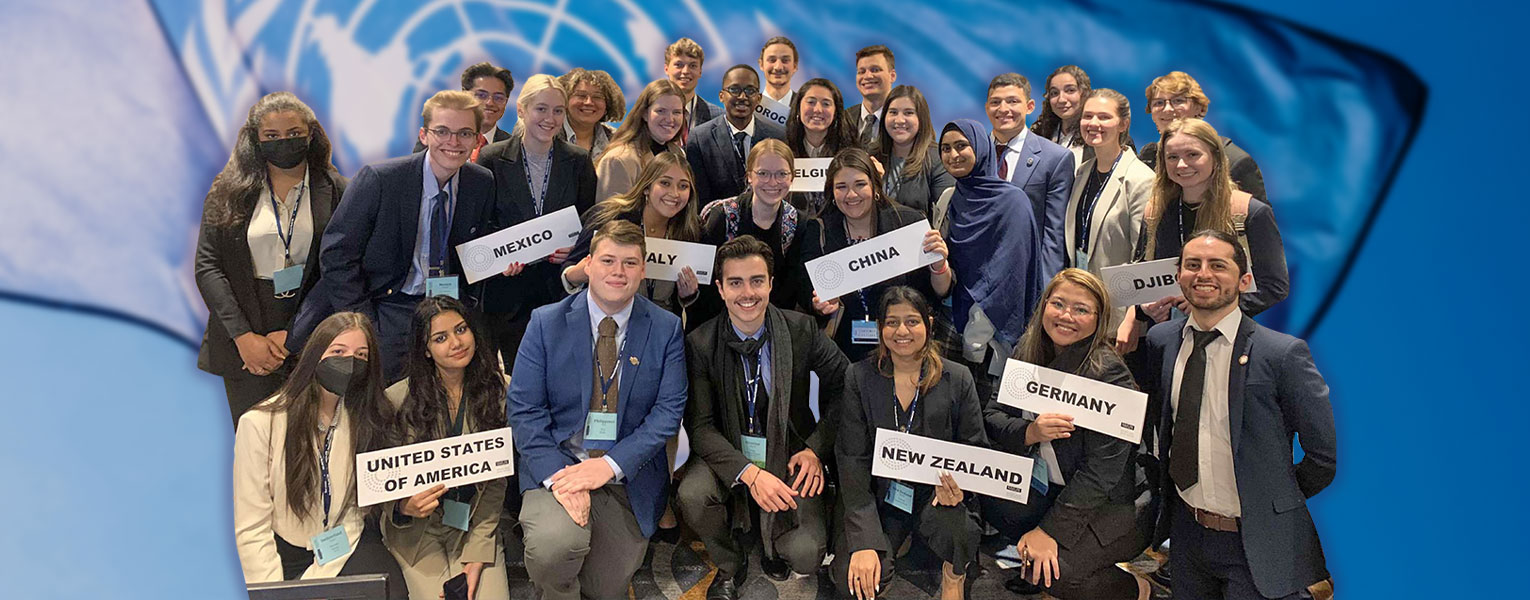7/19/2023
Florida Atlantic: The Art of International Engagement
FAU’s Leon Charney Diplomacy Program Paves Path to Leadership for Student Delegates
Winning five national titles and dozens of conference awards, Florida Atlantic University’s Leon Charney Diplomacy Program has set a new standard of excellence at the annual National Model United Nations (NMUN) diplomacy competitions.
More than 400 colleges and universities compete each year at the world’s largest and oldest ongoing university-level Model UN, and Florida Atlantic is one of the few institutions to achieve such high levels of accomplishment. Through rigorous diplomacy training in a world-class educational setting, the FAU team is not only leading the NMUN, but is preparing to lead future generations.
The Diplomacy Program was established in 1996 by Jeffrey Morton, Ph.D., professor in FAU’s Dorothy F. Schmidt College of Arts and Letters and Pierrepont Comfort Chair in Political Science in the Harriet L. Wilkes Honors College. It has had monumental success over the years including consistently being recognized as the top program in the nation.
Amid the circumstances of the COVID-19 pandemic, FAU won the NMUN’s virtual competition in 2020, which secured the program’s second national title since 2018. The program then achieved an unprecedented triumph in the competition’s 95-year history in 2021, winning first place at both the Washington, D.C. and New York conferences in the same academic year.
Following up with another first-place finish at the November 2022 conference in Washington, D.C., the program achieved its fifth national title and preserved its status as the top-ranked academic diplomacy program in the country. The program also received seven delegation awards during this competition, recording a total of 66 national and international awards for academic excellence to date.
“There are so many variables that go into a nationally competitive academic program,” Morton said. “Chief among them are quality students willing to undergo intense training, support from the community and experienced leadership.”
Diplomacy Through Experiential Learning
During diplomatic competitions, delegates are assigned roles to perform and countries to represent. To prepare, students compose a portfolio that includes country information, topic backgrounds and country profiles that are judged by conference organizers. Full participation requires delegates to make speeches, draft resolutions, negotiate with allies and adversaries, and navigate rules of procedure — all in the interest of mobilizing cooperation to resolve problems that affect people around the world.
With more than 100 different countries, as well as a multitude of backgrounds represented at FAU, intercultural competencies are reinforced each time students come to campus. For the Diplomacy Program’s delegates, these connections allow them to build on their formal training through exposure to different beliefs, identities and ideas.
Isabella Olofson-Ring, a distinguished delegate majoring in political science and cybersecurity, was keen to leverage her leadership experience with the FAU Student Government’s Multicultural Programming Board.
“This organization has prepared me for diverse opinions and identities,” she said. “It prepared me for conferences such as NMUN and to respond well to criticism, change and substance.”
With a strong multicultural foundation, FAU’s students are primed to succeed as global citizens — whether they are attending competitions or taking charge in their communities. For the Leon Charney Diplomacy Program, it has translated into multiple conference titles and national attention.
“Experiential learning for our students in the Leon Charney Diplomacy Program uniquely prepares them for myriad careers in which research, presentation of complex ideas, and cross-cultural negotiation are key elements of success,” said Michael Horswell, Ph.D., dean of the Dorothy F. Schmidt College of Arts and Letters. “Dr. Morton and his colleagues have mentored our students to an unprecedented level of national titles, and we are very proud of that achievement.”
From Competitions to Tangible Change
FAU’s student delegates are more than just NMUN champions — they’re taking their talents into the world to enact meaningful change.
“I have students who intend to be surgeons, lawyers, investors, government officials, academics and officers in the military,” Morton said. “My goal is to convince them on day one that the skills this program teaches are applicable in every professional walk of life.”
Bernard Harrigan, member of the program’s 2021-22 NMUN National Championship Team and recipient of the competition’s Outstanding Delegate award, said he is passionate about combating environmental issues such as the devastation of Florida’s barrier reef systems. He is pursuing a bachelor’s degree in environmental justice and social change at the Harriet L. Wilkes Honors College on FAU’s John D. MacArthur Campus in Jupiter.
As a Morton Research Fellow, Harrigan conducted important undergraduate research on climate change and diplomatic relations regarding law and jurisdiction. His work seeks to make the world a more equitable and inhabitable place by cultivating community engagement and developing more sustainable solutions for the environment.
“My experience in the Leon Charney Diplomacy Program was one filled with excellence,” Harrington said. “The training and competitions raised my confidence to a greater level, and because of it, I was awarded a national Udall Scholarship — the first in FAU history.”
Harrigan’s success is not unprecedented for students in the program. Upon graduation, many delegates continue to leverage their skills in careers with major international organizations such as the United Nations, NATO and the International Civil Aviation Organization. Among the opportunities available to students of this caliber, several alumni have become professors, ambassadors, senators and other highly respected professionals.
“The program had a tremendous impact on my academic and career plans,” Olofson-Ring said. “Before the program, my route was law school. Now I plan to attend graduate school to achieve a degree in foreign relations and pursue a career in diplomacy.”
Leon’s Legacy
The program’s namesake, the late Leon Charney, serves as an inspiration for the student delegates. In 1978, Charney, a lawyer and businessman, helped facilitate the Camp David Accords, which established the peaceful relationship between Israel and Egypt that endures to this day. Charney was awarded an honorary doctorate from Florida Atlantic in 2015 in recognition of his lifelong commitment to peace through diplomacy.
Charney’s family continued his extraordinary legacy with a $1 million gift in 2017, which established three Leon Charney Scholarships and created an Undergraduate Honors Program delegation, as well as an FAU High School delegation.
“This gift transformed the program into a multi-college, university-wide endeavor,” Morton said.
With his name serving as a reminder of one’s ability to champion peace, members of FAU’s Leon Charney Diplomacy Program are prepared to continue his mission for generations to come.
“My experience in the Leon Charney Diplomacy program was transformational,” said Kyle Webb, a distinguished delegate majoring in public administration with minors in political science and disaster management. “I am more excited than ever about my commitment to public service and my passion for international issues.”
Preparing for the Future
FAU’s Diplomacy Program will compete once again in the NMUN’s Washington, D.C., competition this year — this time as three-peat champions. As the team prepares to earn another title, the program leaders will continue teaching, coaching and motivating the student delegates to perform at the highest level.
To ensure the perpetuity of the Leon Charney Diplomacy Program, as well as its ongoing success, philanthropic involvement is essential. As a self-funded program since its inception, public donations such as the Charney family’s provide student delegates with the necessary resources to achieve.
“The Leon Charney Diplomacy Program benefits significantly from the support of donors who help to fund our trips each year,” Webb said. “This provides opportunities for students to attend the conferences at no additional cost and allows us to focus on the necessary preparation to succeed.”
Learn more about ways to support the program’s success: fauf.fau.edu/diplomacy.
If you would like more information, please contact us at dorcommunications@fau.edu.
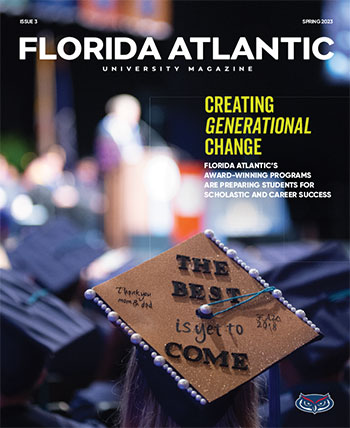
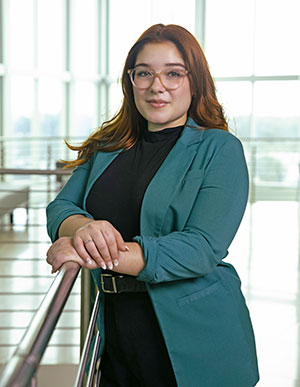
"This organization has prepared me for diverse opinions and identities. It prepared me for conferences such as NMUN and to respond well to criticism, change and substance."
—Isabella Olofson-Ring
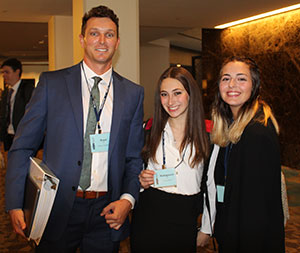
FAU students Andrew Chambers, Gianna Kohn and Maxine Nichols
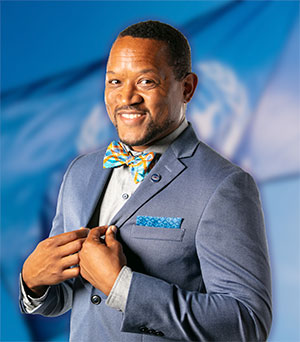
"My experience in the Leon Charney Diplomacy Program was one filled with excellence. The training and competitions raised my confidence to a greater level, and because of it, I was awarded a national Udall Scholarship — the first in FAU history."
—Isabella Olofson-Ring
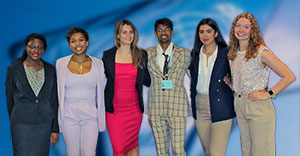
Florida Atlantic representatives at a recent diplomacy conference, from left: Francesca Val, Regina Francis, Vaden Hughes, Emaad Khan, Vesal Farsian and Anna Murphy
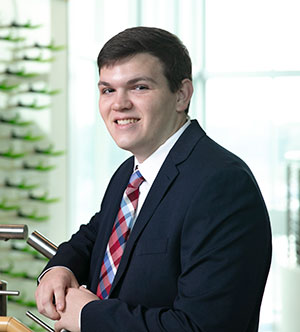
"My experience in the Leon Charney Diplomacy Program was was transformational. I am more excited than ever about my commitment to public service and my passion for international issues."
